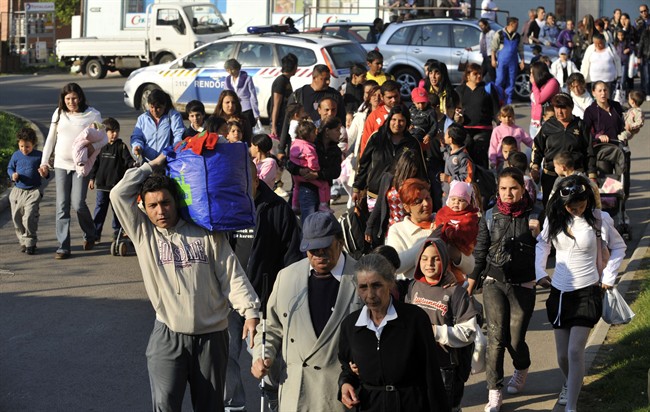<p>GYONGYOSPATA, Hungary – Police detained several members of a far-right vigilante group Friday after hundreds of frightened Roma women and children were bused out of a village where it was planning to train.</p> <p>The Hungarian Red Cross said it evacuated 277 people from the village of Gyongyospata by bus to other parts of Hungary because the local Roma are concerned about potential confrontations with members of the Vedero, or Defence Force.</p> <p>”We are afraid and we have reason to be,” said Janos Farkas, chairman of the local Roma council. “For the past nearly two months, Gyongyospata has been practically a battlefield.”</p> <p>The government, however, said that the Red Cross was taking the families on a pre-planned holiday and the suggestion they were evacuated for security concerns was “a clear political provocation.”</p> <p>”There was no acute situation which would have justified an evacuation,” said government communications chief Zoltan Kovacs, adding that new legislation which went into force on Friday gave police a wider legal base on which to step up against uniformed groups like Vedero.</p> <p>”No paramilitary group can act in place of the police or the national guard,” Kovacs told the AP. “Maintaining order is the task of the state.”</p> <p>Police detained Vedero commander Tamas Eszes on Friday afternoon, leading him away in handcuffs from the plot in the village where the training was planned.</p> <p>Eszes, wearing in a red beret, heavy boots and camouflage gear with what appeared to be German military insignia, shouted to the other members of the group to continue with the training. Police, however, later also detained several others members of Vedero as they gathered in the village.</p> <p>Several far-right vigilante groups, usually dressed in military-like uniforms, have been patrolling the village, and others in eastern Hungary that have large Roma populations, with the stated purpose of defending the non-Roma residents from “Gypsy crime.”</p> <p>Farkas said that members of Vedero who went to the village last week to scout a location for their training camp had shouted violent threats at the Roma.</p> <p>”They want to intimidate the Roma here,” Farkas said. “Their presence is extremely upsetting and will achieve nothing.”</p> <p>The Red Cross, which organized and financed the trip, said the families had been taken “camping.”</p> <p>”They turned to the Red Cross because they couldn’t pay for it themselves,” said Hungarian Red Cross director Erik Selymes. “Our mission is to help those in need.”</p> <p>Police vans started entering the village Friday morning, after the buses had gone, and several hundred officers, many in riot gear, could be seen in the area.</p> <p>Vedero leader Eszes said his group was not racist, had not taken part in anti-Roma village patrols and had no connection to any political party.</p> <p>”This is unnecessary scaremongering and they want to put the ‘extremist’ tag on us,” Eszes said of the Roma evacuation. “We met earlier with Gypsy leaders and reassured them about our activities.”</p> <p>Eszes said Vedero had recently purchased the 1.5-acre plot in Gyongyospata because of its low price and planned to hold training activities there every month from now on.</p> <p>”We’ve held many camps in several locations because until now we didn’t have our own base,” Eszes, a 47-year-old karate instructor, told The Associated Press in a telephone interview hours before his detention.</p> <p>Eszes said his group wanted to improve the physical condition of Hungarian youths, blaming its decline partly on the elimination of the military draft, abolished by lawmakers in 2004.</p> <p>”Hungary’s youth are in bad physical shape, sitting in front of a computer all day,” Eszes said. “We are continuing the old Hungarian tradition of military-style training.”</p> <p>At the same time, Eszes said “Gypsy crime” was an “existing problem which can’t be denied,” pointing to the high percentage of Roma among Hungary’s prison population.</p> <p>”But that is not our problem,” Eszes said.</p> <p>Eszes said that recent verbal confrontations in the village were started by the Roma, and that Vedero had called for police protection. “Why would three or four of us want to take on 70 Gypsies?”</p> <p>According to Vedero’s website, which was blocked late Friday by the service provider, the training camp starting Friday was open to “all youths and adults who love their country and who are interested in learning military and self-defence basics.”</p> <p>Trainees are also encouraged to bring Airsoft weapons – realistic-looking pellet rifles and guns – and boxing gloves.</p> <p>”Military disciplinary rules will be in effect on the campsite during the three days,” the advertisement says.</p> <p>Citizens’ security, especially in the countryside, which has been especially hard hit by recession and rising unemployment, was a central theme of the 2010 elections.</p> <p>Prime Minister Viktor Orban, whose Fidesz party won an unassailable two-thirds majority in parliament, vowed to increase the police presence in remote locations and said his government would quickly solve the issue.</p> <p>”Within two weeks, we will make order in the parts of the country which today seem hopeless,” Orban said after the first round of voting last year.</p> <p>Jobbik, a far-right party that won an unprecedented 16.7 per cent of the votes in 2010, made “Gypsy crime” one of the focal points of its campaign and, as its support began to slip, recently began holding countryside rallies around that theme.</p> <p>Jobbik’s rise was aided by the Hungarian Guard, a uniformed group with several thousand members that held several anti-Roma marches. The Guard was disbanded by the courts in 2009 and Orban vowed to enforce the ban.</p> <p>___</p> <p>Gorondi reported from Budapest, Hungary.</p>

- Canada refused to repatriate woman from ISIS camp because she can’t be arrested: internal memo
- Haiti’s PM resigns, paving way for new elections in violence-plagued nation
- U.S. tourist faces 12-year sentence for bringing ammo to Turks and Caicos
- Is Trump immune in the 2020 election case? What to watch for during hearing




Comments